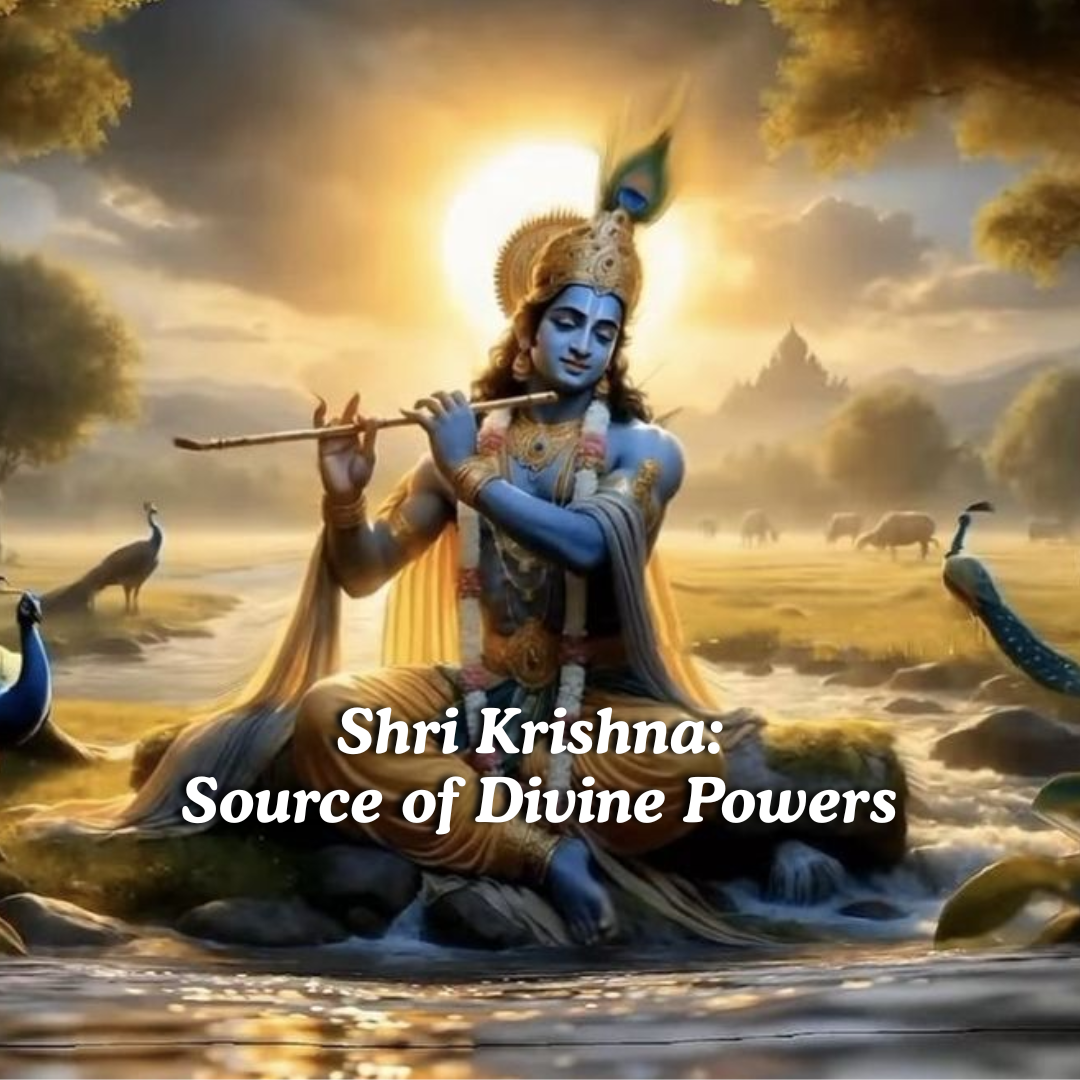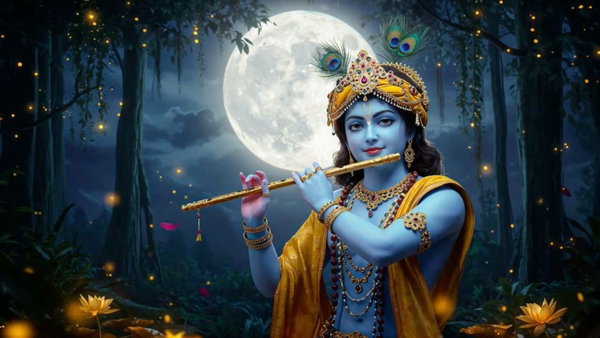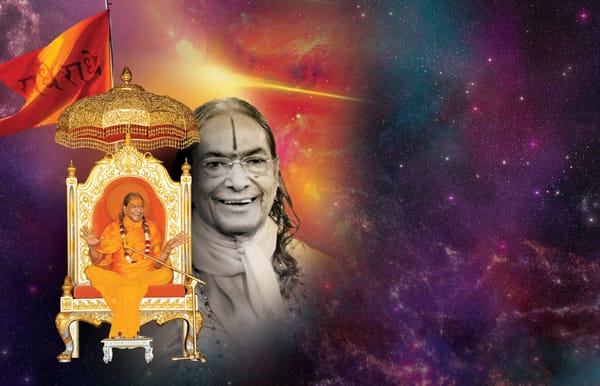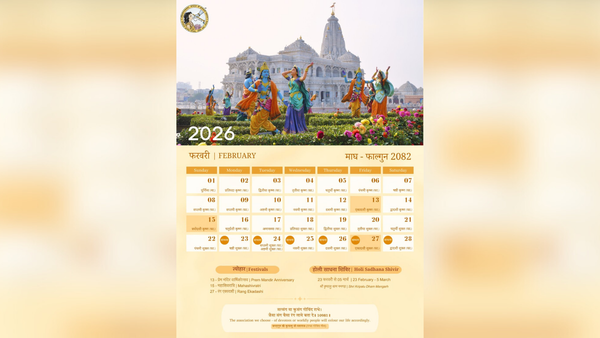Daily Devotion - Sep 18, 2025 (English)- Narad Bhakti Darshan - Part 7

From Chit Shakti (Parā Shakti):
(i) From Sandhini anubhāv - Shri Krishna's name, form, līlā, qualities, abode (Golok), etc. are manifested.
(ii) From Samvit anubhāv - The most magnificent nectar of Shri Krishna's beauty (saundarya), sweetness (mādhurya), opulence (aiśvarya), virtuousness (sauśīlya), youthfulness (saukumārya), etc. is created. By this very power, Shri Krishna Himself becomes enchanted by His own form.
(iii) From Hlādinī anubhāv - Shri Krishna's bliss of divine love (premānand) is attained. This is the greatest thing. The ultimate limit of this premānand is Radha -
Premera parama sāra mahābhāvaṁ jāni। sei mahābhāva rūpa rādhā ṭhakurāni।
Hlādinī śaktera parama sāra tāra prema nāma।
- Jīva shakti is minute, which is why it is considered atomic (aṇu). It is not all-pervading but rather pervaded. From jīva shakti:
(i) From Sandhini anubhāv - The existence of the soul is protected. That is, we are eternal beings - we were, are, and will always be.
(ii) From Samvit anubhāv - The soul attains the knowledge of Brahm - Brahm-gyān.
(iii) From Hlādinī anubhāv - The soul attains moksh (the liberation of gyānīs). - Māyā shakti is an opposing power, which is why its results are distorted. So from māyā shakti:
(i) From Sandhini anubhāv - This material world is created along with the names, forms, and activities of these objects.
(ii) From Samvit anubhāv - The soul experiences anxiety, sorrow, and tension.
(iii) From Hlādinī anubhāv - Material pleasure (viṣayānand) is obtained from worldly objects (such as the joy of embracing one's child, the pleasure of eating sweets, etc., whose superior form is found in heaven). All pleasures up to heaven are the result of māyā's hlādinī anubhāv -
Ābrahmabhuvanāllokāḥ punarāvartino'rjuna
The presiding deity over all of these is one Supreme Lord Shri Krishna. Whatever you think, know, or do - that is, gyān (knowledge), bal (will), and kriyā (action) - these three are complete in God, while within us they exist in a minute form. But they are always connected to Him - the soul becomes powerful only through His shakti. Whatever powers exist in God also exist within us. The only difference is one of limit. We are limited, He is unlimited - that is all. But everything is present within us too, because we are parts of Sat-Chit-Ānanda Brahm. Therefore, the reactions of all three shaktis - sandhini, samvit, hlādinī - are also present in us. All our attributes are limited; all His attributes are infinite - satyaṁ gyānamanantaṁ brahm - His existence is infinite, His knowledge is infinite, His hlādinī is infinite.
It is by the wonder of these three powers that God gives His knowledge (gyān), bliss (ānanda), and ras (divine nectar) to the soul as well. God has two functions -
Bṛhati bṛṁhayati -
He who is Himself great and makes others great. Therefore, He makes the surrendered soul great. That is, one who understands the relationship - his relationship with God becomes established. By the grace of God, the knowledge and the bliss of divine love that God possesses will also be attained by the soul.
Therefore, the explanation of raso vai saḥ is - rasyate rasayati
Rasyate means one whose ras, whose bliss is enjoyed - that is God.
And rasayati iti rasaḥ - He Himself also enjoys the nectar.
That is, the same God whose bliss we enjoy is Himself also a connoisseur of bliss.
Shri Krishna is the source of supreme bliss - He is both ras and rasik. How is this so? When He gives premānand to the devotee, that devotee, becoming completely absorbed and permeated by it, offers it back to God, and that very bliss is received by God. Therefore, God is Himself both ras and rasik. He gives to others and makes the soul equal to Himself.
Thus, our relationship is only with Shri Krishna. And Shri Krishna Himself cannot give complete information about Himself - what to speak of others - because He is infinite, therefore no one can measure Him.
To strengthen that relationship, one must repeatedly contemplate upon it. When we have understood and accepted that Shri Krishna alone is our relative, then contemplation of Him will automatically begin.
And from contemplation -
Māmanusmareśchittaṁ mayyeva pravilīyate
Through contemplation, our sense of belongingness becomes firm. Through continuous contemplation, the mind becomes attached. That is, if sambandha-gyān matures, then abhidheya - that is, sādhana - happens automatically.To the extent that your sambandha-gyān matures, to that same extent you will contemplate. As contemplation increases, attachment will increase proportionally. And when complete faith in the relationship develops, then this yajgyātvā will be successful.
The word yajgyātvā means "upon knowing Whom." This knowing should be constant - i) at all times, ii) in all places, and iii) in all objects, this sambandha-gyān should remain. This alone is the test of whether sambandha-gyān is firm or not.
Wherever you go, this sentiment should remain: "Shri Krishna alone is my relative, Shri Krishna alone is my relative." You experience this in Vrindavan, as Maharaj Ji has explained, but forget when you go to other worldly places. No - yo māṁ paśyati sarvatra - you should remember this everywhere.
Deśa, kāla, vastu - these are the three. In all three of these, the knowledge should become firm that He is ours alone and is present everywhere. Then there will be no hatred toward any object, time, or place, because everywhere our Shri Krishna is pervading.
In abhidheya, that is, in sādhana bhakti, there are three main elements:
Śrotavyaḥ kīrtitavyaśca smartavyaśchecchatābhayam। (Bhāgavatam)
i) Śrotavyaḥ - listening - this is also kirtan.
ii) Kīrtitavyaścha - singing the names, glories and pastimes of God
iii) Smartavyaścha - remembrance (smaran) of Shri Krishna (this is the main).
There are three methods of kīrtan -
- Vyāsa paddhati
- Nārad paddhati
- Hanumat paddhati
(to be continued...)
Recommended books by Jagadguru Shri Kripalu Ji Maharaj related to this topic:





